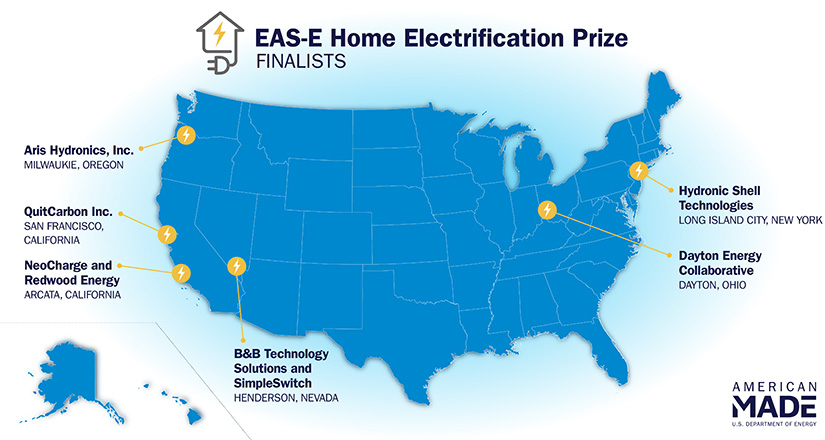Prize Finalists Make Home Electrification Solutions Look EAS-E
The Equitable and Affordable Solutions to Electrification Prize Announces 6 Finalist Teams
Buildings account for 35% of U.S. energy-related emissions, and the path to a nationwide net-zero-emissions economy will require many electric building technologies powered by sustainable energy sources. Electrification transitions away from fuel-burning appliances to more efficient, electric alternatives and allows consumers to tap into clean, renewable energy sources.
For the finalists in the Equitable and Affordable Solutions to Electrification (EAS-E) Prize, electrification starts at home.

Easy, Affordable, Equitable Electrification
The EAS-E Prize, which launched in December 2022, is offering up to $2.4 million in cash prizes and technical assistance to accelerate the development and deployment of easy, affordable, and equitable electrification approaches.
However, every building is unique. Not all homes have the same upgrade needs, and the cost and complexities of home electrification can be a challenge for certain dwellings, particularly those in low-income communities, multifamily homes, mobile homes, older homes, and homes located in colder climate regions.
During Phase 1, competitors submitted concepts for innovations that break through those barriers. Based on their novel solutions that address the challenges of home electrification, six teams have been named finalists. Each finalist team will receive $5,000 in cash and a $75,000 voucher to work with national laboratories and American-Made Network Connectors to advance their electrification solutions and prepare to compete in the final demonstration phase.
"EAS-E Prize finalists were chosen for their innovative visions of how home electrification can be made simpler and more affordable for all homeowners," said Wyatt Merrill, technology manager with the U.S. Department of Energy's Building Technology Office. "We are thrilled to see how these teams bring their concepts to life in the demonstration phase."
Meet the Finalists
- NeoCharge and Redwood Energy (Arcata, California) will demonstrate a whole-home electrification of all major gas appliances with 120-volt alternatives. They will integrate smart circuit splitters to avoid the need for costly electrical panel upgrades. Energy and power will be monitored and controlled, providing load flexibility, grid resiliency, and home energy insights.
- Aris Hydronics Inc. (Milwaukie, Oregon) is developing and manufacturing a modular, multifunction air-to-water heat pump system, especially applicable to multifamily housing, that incorporates a unified grid-interactive energy management control platform that provides heating, cooling, and domestic hot water.
- Hydronic Shell Technologies (Long Island City, New York) is prototyping and demonstrating an HVAC-integrated façade panel system installed onto the building exterior for noninvasive building electrification of multifamily housing. The modular, exterior application allows building tenants to remain in their units during electrification retrofits.
- QuitCarbon Inc. (San Francisco, California) is developing software to make design and planning of electrification retrofits significantly faster and easier for homeowners and contractors. Their application-based innovations to the planning process are designed to improve approaches to auditing, design, planning, and incentive/rebate utilization.
- Dayton Energy Collaborative (Dayton, Ohio) is developing and implementing a blueprint for community-level, cold-climate electrification retrofits targeting low-income households, with weatherization and heat pump upgrades, watt dieting, smart outlets, circuit sharing, and smart electrical panels.
- B&B Technology Solutions and SimpleSwitch (Henderson, Nevada) will use smart circuit switching between 240-volt electric end uses while monitoring whole-home current draw to provide control logic and eliminate coincident peak loads. This solution provides benefits associated with smart panel operation without the need for a panel upgrade.
The finalists' solutions will not only help transition residential building stock toward a more sustainable future but also benefit the broader housing retrofit market by advancing building electrification solutions that are fast, easy, and scalable. Innovations like these play a critical role in the equitable transition to a decarbonized energy system by 2050.
The EAS-E Prize is funded by the U.S. Department of Energy Building Technologies Office and administered by the National Renewable Energy Laboratory.
Learn more about NREL's world-class buildings research.

